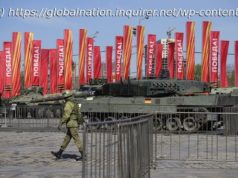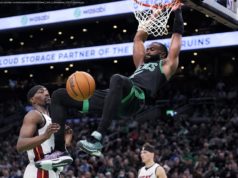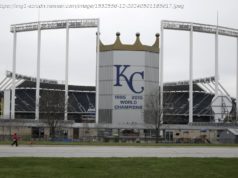The knottiness of Northern Ireland is by design. Remaining stuck is the only way the place works.
Three seismic events have occurred in one go in Northern Ireland. One, for the first time in Northern Ireland’s 100-year existence, an Irish nationalist party placed first in an election—and not just any nationalist party, but Sinn Fein, the longtime political wing of the Irish Republican Army. Two, the Alliance Party, which challenges the traditional Protestant-Catholic division that has defined Northern Ireland since its inception, scored its best-ever result and has now established itself as a genuine third force in Northern Irish politics. And three, the great political row that has dominated Northern Irish politics since Brexit—over the so-called protocol establishing new border controls—was tested with the public, and while those that oppose it have hardened in their opposition, a majority voted for parties that are fine with it. The truth of Thursday’s elections, then, is surely that the reunification of the island of Ireland is now more likely, and that Northern Ireland will finally be able to put to bed the divisions over Brexit and move on. Right? Wrong. The reality is that Northern Ireland remains as stuck as ever, a Gordian knot without an Alexander to slice it open. In fact, in Northern Ireland there can be no Alexander—and that is the point. The knottiness of Northern Ireland is by design. Remaining stuck is the only way the place works. Two inescapable truths continue to govern Northern Ireland. The first is that while Sinn Fein emerged ahead of all other parties in Thursday’s election, a sizable majority of the electorate is still in favor of remaining part of the United Kingdom rather than joining the Republic of Ireland. The second is that the Northern Ireland that exists is a strange, unfair, and largely dysfunctional place that works only when both its nationalist and unionist communities consent to the system governing it. While more people are now voting for the third-way Alliance Party, which argues that other bread-and-butter issues matter more than unionism or nationalism, for now, Northern Ireland’s political and constitutional reality remains unchanged. Under the Good Friday Agreement, power must be shared between the two largest designations elected to the Northern Irish Assembly, which has thus far been made up of blocs identifying as unionist and nationalist. Until those that declare themselves “other”—such as the Alliance Party—finish in the top two, it doesn’t matter whether a nationalist or union party finishes first or second, because they must share power with the other. This reality most directly affects the future of the Northern Irish protocol agreed upon by the United Kingdom and the European Union in 2019 as part of Prime Minister Boris Johnson’s Brexit divorce deal.






